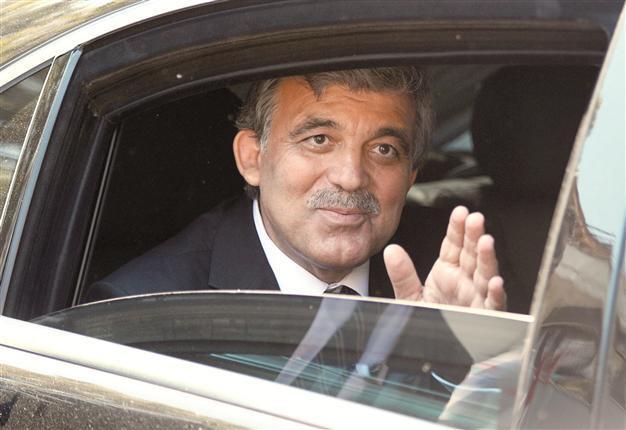Who will elect the president?
ANKARA - Hürriyet Daily News

Ankara debates how to elect the president as August 2014 nears.
In the political lobbies of Ankara, a different debate is ongoing for some time. This debate focuses on election method of the Presidential elections on August 2014 that will be at the top of our agenda after the local elections. The answer to the following question is being sought: “Will the Parliament or the people elect the President?”
According to Article 101 of the Constitution, the president will be elected by popular vote for the first time. Before October 21, 2007, the president was elected by the Parliament. The reason the ruling Justice and Development Party (AKP) have reached this stage was a major state crisis. In 2007, Prime Minister Erdoğan announced Abdullah Gül’s name for Çankaya in a party group meeting. On April 27, the first round of voting in the Parliament was held. Despite Gül’s receiving 357 votes, as a result of the argument initiated by then the public prosecutor Sabih Kanadoğlu that the quorum must be 367, upon opposition Republican People’s Party’s (CHP) filing an application, the Constitutional Court annulled the voting.
In the evening of April 27, a statement that the then Chief of General Staff Yaşar Büyükanıt said later he himself drafted was released on the official website of the General Staff. The memorandum was drawing attention to the sensitivity of secularism and contained warnings. The government responded harshly to the memorandum via Cemil Çiçek. Next, an early election decision was made for July 22.
After the elections, AKP was again governing alone. Abdullah Gül was elected as the 11th President at the third round in the Parliament. A constitutional change was made to prevent similar interventions so that the president was to be elected by popular vote. The proposal was opposed by CHP and 10th President Ahmet Necdet Sezer. A referendum was held and 68 percent of people accepted this change.
Presidential electionsA major crisis was overcome this way. And at the stage we have reached, while there is nearly one year’s time until the president is to be elected by popular vote in August 2014, a new scenario is being debated at the lobbies. This scenario is the election of the president again by the Parliament and it is based on the ruling party AKP’s local election success or failure. Here is how the scenarVio looks:
Depending on the results of the local elections, the AKP can come up with a proposal that the Parliament elects the president again instead of the people electing the president; because if votes fall in the local elections, that will definitely affect the Presidential elections. It might be difficult to exceed 50 percent in the first round. Then in the second round, there is the risk of the opposition uniting over one candidate. This situation may jeopardize the election of the AKP candidate. Hence, after the local elections (depending on the results), the AKP may come up with a proposal that the Parliament elects the President. However, it can also shoot two birds with one stone by asking for support from the opposition to its proposal for “president affiliated with a political party.”
If this proposal comes, then what would be the stance of the opposition? The CHP and Nationalist Movement Party (MHP) could favor this proposal because both of these parties have already issued proposals for the new constitution that the Parliament elect the president. They may support the AKP proposal in such a case. CHP and MHP do not favor the “president affiliated to a political party” model; however in order to secure that the president is again elected by the Parliament and to eliminate the presidential system demand entirely, they might be obliged to say “yes” to this. The Peace and Democracy Party (BDP), in connection with the resolution process, would not oppose that.
Erdoğan wants to ascend to Çankaya with strong powers and wants to continue ruling his party from there. Since the presidential system would notW be under these circumstances, this scenario stands out. If this plan is successful, then Erdoğan would both be easily able to select his party’s 2015 staff and base general elections on the presidential system campaign he wants so much. For the moment, this is only a scenario. Whether this will become real or not, will be determined by the arithmetic results in the local elections…
Will threshold be the surprise?
It is expected that the fifth of the democratization packages of Prime Minister Recep Tayyip Erdoğan will be released this week.
According to recent hearsay echoing in the lobbies, there may be certain surprises in the package. Rumor has it that the countywide threshold of 10 percent may come down a few points. A decrease or elimination of the threshold was among the insistent demands of the Kurdish side. Despite this, Prime Minister Erdoğan and AKP executives insisted that the current threshold be maintained.
My impression is that even though it is being talked about in the lobbies, the AKP is not quite eager to lower the threshold. If they are obliged to lower the threshold at the last minute, then that would be the biggest surprise of the package…
First headscarf-wearing candidate
The democratization package of the government also contains freedom for wearing of the headscarf in the public domain. An amendment will be made in the 657 Numbered Civil Servants Law and those articles that ban the headscarf for public employees will be eliminated. The ruling Justice and Development Party (AKP) is preparing to have a headscarf-wearing candidate at local elections.
According to whispers, an opportunity will be given to headscarf-wearing candidates in some provinces and in some districts, primarily those in Istanbul. The AKP executives are, thus, trying to open doors also for headscarf-wearing deputies…
